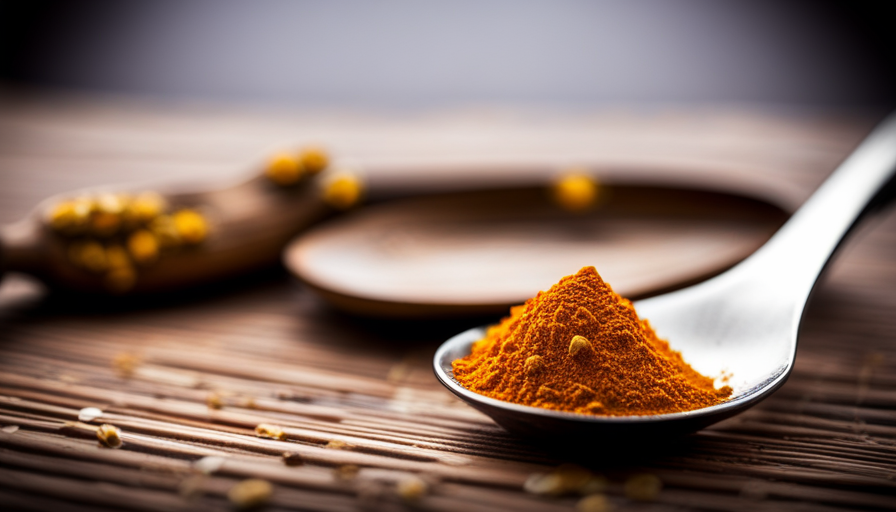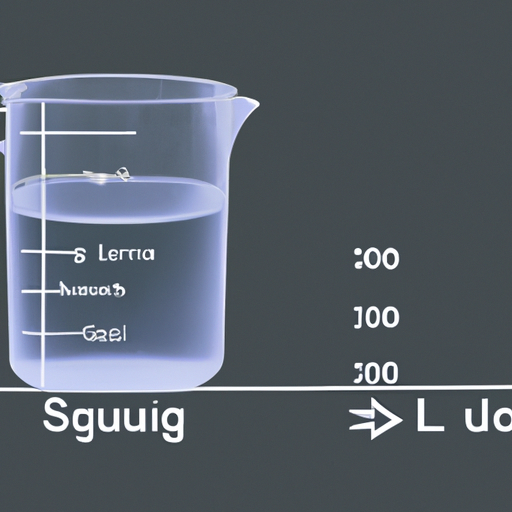Did you know that turmeric has been used for centuries in traditional medicine? It’s no wonder that this vibrant yellow spice has gained popularity in recent years for its numerous health benefits. In fact, studies have shown that curcumin, the active compound in turmeric, has powerful antioxidant and anti-inflammatory properties.
But when it comes to reaping the benefits of turmeric, should you choose turmeric tea or tablets?
Turmeric tea, made by steeping turmeric powder in hot water, offers a soothing and comforting way to enjoy the spice. On the other hand, turmeric tablets provide a convenient and standardized dose of curcumin. So which is better?
In this article, we will explore the pros and cons of turmeric tea and tablets, as well as the bioavailability of curcumin. We will also discuss factors to consider in choosing a form and whether it is possible to combine both options. By the end, you will have a better understanding of which option is best for you in harnessing the power of turmeric for your health and well-being.
Key Takeaways
- Turmeric tea contains curcumin, which has powerful antioxidant and anti-inflammatory properties that can help reduce inflammation and alleviate symptoms of conditions like arthritis, heart disease, and cancer.
- Turmeric tea is rich in antioxidants and allows for better absorption of curcumin when consumed with black pepper and a source of fat.
- Turmeric tablets provide a concentrated form of curcumin and ensure consistent dosing.
- Combining turmeric tea and tablets maximizes the benefits of turmeric by providing a comprehensive health boost and increasing the absorption of curcumin.
Health Benefits of Turmeric
If you’re looking to maximize the health benefits of turmeric, you’ll find that sipping on a warm cup of turmeric tea can be more advantageous than simply taking tablets. Turmeric is a spice that has been used for centuries in traditional medicine for its numerous beneficial properties.
One of the key reasons why turmeric tea is preferred over tablets is because it contains the active compound called curcumin, which has powerful anti-inflammatory properties. Studies have shown that curcumin can help reduce inflammation in the body, which is the root cause of many chronic diseases. By regularly consuming turmeric tea, you can potentially alleviate symptoms of conditions such as arthritis, heart disease, and even certain types of cancer.
Additionally, turmeric tea is rich in antioxidants, which can help protect your cells from damage caused by harmful free radicals. Not only does turmeric tea provide the anti-inflammatory benefits of curcumin, but it also allows for better absorption of the compound by the body. Curcumin is not easily absorbed by our bodies, but when consumed with black pepper and a source of fat, such as coconut milk, its absorption is greatly enhanced.
If you’re looking to harness the full potential of turmeric’s health benefits, turmeric tea is a great option. Its anti-inflammatory properties and antioxidant effects can contribute to improving your overall well-being. Transitioning to the subsequent section about ‘turmeric tea: pros and cons’, it’s important to consider both the benefits and potential drawbacks of consuming turmeric tea.
Turmeric Tea: Pros and Cons
One option to consider when exploring the benefits and drawbacks of turmeric tea is weighing the pros and cons. Turmeric tea is a popular alternative to turmeric tablets because of its ease of preparation and enjoyable taste. To make turmeric tea, simply steep a teaspoon of turmeric powder in hot water for about 10 minutes. This method allows the active compounds in turmeric, such as curcumin, to be released and easily absorbed by the body.
There are several advantages to consuming turmeric tea. Firstly, it provides a warm and soothing beverage option, especially during colder months. Secondly, turmeric tea is a natural way to support digestion and reduce inflammation. It can also help boost the immune system and promote overall well-being. Lastly, turmeric tea can be personalized by adding other beneficial ingredients like ginger or lemon.
However, it is important to note that turmeric tea may not be suitable for everyone. It’s recommended to consume turmeric in moderation, as excessive amounts may cause digestive issues or interact with certain medications. It’s also important to follow the recommended dosage guidelines and consult with a healthcare professional if you have any concerns.
Turmeric tea offers a convenient and enjoyable way to incorporate this powerful spice into your daily routine. However, it’s important to be aware of the potential drawbacks and use it responsibly. Transitioning to the next section, let’s now explore the pros and cons of turmeric tablets.
Turmeric Tablets: Pros and Cons
While they may seem like a convenient option, it’s important to consider the pros and cons of turmeric tablets before incorporating them into your wellness routine. Turmeric tablets are a popular alternative to turmeric tea due to their convenience and standardized dosage. They contain a concentrated form of curcumin, the active compound in turmeric, which is known for its anti-inflammatory and antioxidant properties.
One of the main advantages of turmeric tablets is their efficacy and dosage control. Unlike turmeric tea, where the concentration of curcumin can vary, tablets provide a standardized amount of curcumin, ensuring consistent dosing. This can be particularly beneficial for individuals who require higher doses for specific health conditions.
However, it’s important to note that turmeric tablets may have potential side effects. Some individuals may experience gastrointestinal issues such as nausea, diarrhea, or stomach upset. Additionally, turmeric can interact with certain medications like blood thinners, so it’s essential to consult with a healthcare professional before starting any new supplement regimen.
Moving forward, it is crucial to explore the bioavailability of curcumin in turmeric tablets and how it affects its effectiveness.
Bioavailability of Curcumin
To fully understand the effectiveness of curcumin in your wellness routine, it’s important to explore the bioavailability of this compound. Bioavailability refers to the extent and rate at which a substance is absorbed into the bloodstream. When it comes to curcumin, its bioavailability is relatively low, which means that the body has difficulty absorbing and utilizing it.
Here are three key factors to consider regarding curcumin absorption and turmeric bioavailability:
-
Poor solubility: Curcumin isn’t very soluble in water, which makes it difficult for the body to absorb. This is why taking curcumin in its natural form, such as turmeric powder, may not be as effective as other forms.
-
Low stability: Curcumin is also known for its instability, meaning it can degrade easily. This can further reduce its bioavailability and effectiveness when taken orally.
-
Enhanced absorption: To improve curcumin absorption, certain techniques can be used. For example, combining curcumin with piperine, a compound found in black pepper, has been shown to significantly enhance its bioavailability.
Considering these factors, it becomes clear that while turmeric tablets may contain curcumin, their bioavailability may be limited. This is an important consideration when choosing between turmeric tea and tablets.
Factors to Consider in Choosing a Form
When considering which form of curcumin to choose, there are several factors to take into account.
Firstly, personal preference and lifestyle play a significant role. Some individuals may prefer the convenience and ease of taking curcumin in tablet form, while others may enjoy the ritual of preparing and drinking turmeric tea.
Secondly, specific health goals should be considered. For example, if someone is looking to target inflammation, they may opt for a more bioavailable form of curcumin, such as a supplement with enhanced absorption.
Lastly, cost and availability are important considerations. Turmeric powder for tea may be more readily available and cost-effective, while curcumin supplements may be pricier but offer higher concentrations.
Personal Preference and Lifestyle
You’ll love how turmeric tea perfectly fits into your personal preference and lifestyle! When it comes to choosing between turmeric tea and tablets, personal taste and convenience play a significant role.
Some people enjoy the earthy and slightly spicy taste of turmeric tea, while others may find it too strong. It can be easily prepared at home or purchased ready-made, making it a convenient option for those with busy schedules.
Additionally, turmeric tea can be enjoyed at any time of the day, whether it’s a warm cup in the morning or a soothing beverage before bed. As we transition to discussing specific health goals, it’s important to consider how turmeric tea can be incorporated into your daily routine to support your wellbeing.
Specific Health Goals
Achieving specific health goals has never been easier with the incredible benefits of incorporating turmeric tea into my daily routine. Turmeric is known for its powerful anti-inflammatory and antioxidant properties, making it a natural remedy for various health conditions. Unlike tablets, turmeric tea allows for better absorption of the active compounds, maximizing its effectiveness.
Additionally, turmeric tea provides a soothing and comforting experience, which can be beneficial for stress management and relaxation. It also offers a convenient and enjoyable way to consume turmeric, especially for those who prefer alternative options to tablets. However, it’s important to consult with a healthcare professional to determine the appropriate dosage and ensure that turmeric tea aligns with my specific health goals.
Transitioning into the next section about the ‘cost and availability,’ exploring the accessibility and affordability of turmeric tea is crucial in making an informed decision.
Cost and Availability
The accessibility and affordability of incorporating turmeric tea into my routine can have a significant impact on my overall health journey. When comparing the cost versus effectiveness of turmeric tea and tablets, there are a few key factors to consider:
-
Cost: Turmeric tea is generally more cost-effective than tablets, as it can be made at home using simple ingredients.
-
Accessibility: Turmeric tea ingredients are readily available in most grocery stores, making it easily accessible for anyone.
-
Convenience: Brewing a cup of turmeric tea is quick and easy, making it a convenient option for incorporating into a daily routine.
-
Effectiveness: While both turmeric tea and tablets can provide health benefits, studies suggest that the bioavailability of turmeric compounds may be higher when consumed as a tea.
Considering these factors, incorporating turmeric tea into my routine seems like a practical and effective choice. In the next section, I’ll explore the benefits of combining turmeric tea and tablets for optimal health.
Combining Turmeric Tea and Tablets
When you mix a warm cup of turmeric tea with a couple of turmeric tablets, it’s like a golden elixir flowing through your body, unleashing its vibrant healing powers. Combining turmeric tea and tablets can provide a synergistic effect, maximizing the benefits of this powerful spice.
Turmeric tea supplements are a convenient option for those who prefer a quick and easy way to incorporate turmeric into their daily routine. These supplements contain a concentrated form of curcumin, the active compound in turmeric, which has been shown to have various health benefits. On the other hand, turmeric tablets offer a higher dosage of curcumin, providing a more potent effect.
Research suggests that the effectiveness of turmeric tablets may be enhanced when consumed alongside turmeric tea. The compounds in turmeric tea, such as ginger and black pepper, can increase the absorption of curcumin in the tablets, allowing for better utilization by the body. Additionally, the warm and soothing nature of turmeric tea can complement the effects of the tablets, promoting overall well-being.
Combining turmeric tea and tablets can be a beneficial approach to reap the full potential of this incredible spice. By incorporating both forms into your daily routine, you can harness their individual strengths and experience a more comprehensive health boost. However, it’s important to consult with a healthcare professional before starting any new supplement regimen to ensure it’s suitable for your specific needs.
Conclusion: Choosing the Right Option for You
To make the best choice for yourself, consider your preferences and needs, whether it’s the convenience of a supplement or the potency of a tablet. Both turmeric tea and tablets offer unique benefits, so it ultimately comes down to your personal preferences.
If you enjoy the ritual of brewing and sipping a warm cup of tea, then turmeric tea might be the better option for you. It can be a soothing and calming experience, especially if you add other herbs or spices like ginger or cinnamon. Additionally, turmeric tea allows for a slower release of the active compounds, potentially providing a more sustained effect throughout the day.
On the other hand, if convenience is a priority, turmeric tablets might be more suitable. They’re easy to take on-the-go and ensure a standardized dosage of curcumin, the active compound in turmeric. Tablets also tend to have higher concentrations of curcumin compared to turmeric tea, which may provide more potent health benefits.
Regardless of your choice, both turmeric tea and tablets offer numerous health benefits. Turmeric has been studied for its anti-inflammatory properties, antioxidant effects, and potential to support brain health, heart health, and digestion. It’s important to note that individual responses to turmeric can vary, so it’s always a good idea to consult with a healthcare professional before adding any new supplement to your routine.
When deciding between turmeric tea and tablets, consider your personal preferences and health needs. Whether you enjoy the ritual of tea or the convenience and potency of tablets, both options can contribute to your overall well-being.
Frequently Asked Questions
Can turmeric tea and tablets be taken together?
Taking turmeric tea and tablets together has both pros and cons. On one hand, it may enhance the potential benefits of turmeric. On the other hand, there is a potential for interactions or unwanted side effects. Consulting a healthcare professional is advised.
What are the factors to consider when choosing between turmeric tea and tablets?
When choosing between turmeric tea and tablets, several factors should be considered. These include personal preference, ease of use, potential side effects, bioavailability, and the specific benefits of turmeric tea over tablets.
Are there any potential side effects of consuming turmeric tea or tablets?
Potential side effects of consuming turmeric tea or tablets can include digestive issues, such as upset stomach or diarrhea. Comparing bioavailability, tablets may have higher absorption rates due to concentrated curcumin content.
How long does it take to experience the health benefits of turmeric?
It’s fascinating how quickly we can experience the health benefits of turmeric! To maximize absorption, consume turmeric with black pepper and a source of fat. Curcumin in turmeric has anti-inflammatory and antioxidant properties, offering various health benefits.
Are there any specific populations who should avoid turmeric tea or tablets?
Pregnant women and individuals with gallbladder problems should avoid turmeric tea or tablets. Turmeric’s effectiveness in reducing inflammation can vary, so it’s important to consult with a healthcare professional for personalized advice.
Conclusion
In conclusion, after examining the health benefits, pros, and cons of both turmeric tea and tablets, it’s clear that both forms offer their own advantages. However, just like a symphony, the true power lies in the harmony of their combination. By incorporating both into your daily routine, you can maximize the bioavailability of curcumin and reap the holistic benefits of this golden spice.
So, don’t settle for just one note when you can create a beautiful melody of wellness with turmeric tea and tablets.










